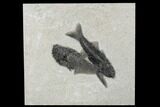This Specimen has been sold.
8.9" Fossil Fish (Diplomystus & Mioplosus) Plate - Wyoming
These are two detailed fossil fish (Diplomystus dentatus and Mioplosus labracoides) collected from the Green River Formation. They were collected from the Clear Creek Quarry near Kemmerer, Wyoming. Both fish show excellent preservation of bones and fin rays and are nicely centered on a rectangular-cut, 8.9 x 8.2" slab of shale.
The Diplomystus is 5.3" long and the Mioplosus measures 5.1" long.
The Diplomystus is 5.3" long and the Mioplosus measures 5.1" long.
About Fossil Lake
50 million years ago, in the Eocene epoch, these fish thrived in Fossil Lake, which was fed by the Uinta and Rocky Mountain highlands. The anoxic conditions at the bottom of Fossil Lake slowed bacterial decomposition, prevented scavengers from disturbing corpses, and, most interestingly, suffocated creatures that ventured into the oxygen-starved aquatic layer. The result is a miraculous exhibition of Eocene biota: a subtropical aquatic community within sycamore forests, teeming with creatures such as freshwater stingrays, dog-sized horses, menacing alligators, early flying bats, and one of the first primates.
50 million years ago, in the Eocene epoch, these fish thrived in Fossil Lake, which was fed by the Uinta and Rocky Mountain highlands. The anoxic conditions at the bottom of Fossil Lake slowed bacterial decomposition, prevented scavengers from disturbing corpses, and, most interestingly, suffocated creatures that ventured into the oxygen-starved aquatic layer. The result is a miraculous exhibition of Eocene biota: a subtropical aquatic community within sycamore forests, teeming with creatures such as freshwater stingrays, dog-sized horses, menacing alligators, early flying bats, and one of the first primates.
SPECIES
Diplomystus dentatus & Mioplosus labracoides
LOCATION
Clear Creek Quarry, Kemmerer, Wyoming
FORMATION
Green River Formation
SIZE
8.9 x 8.2" rock, 5.3" Diplomystus, 5.1" Mioplosus
CATEGORY
SUB CATEGORY
ITEM
#179259
We guarantee the authenticity of all of our specimens.
 Reviews
Reviews













